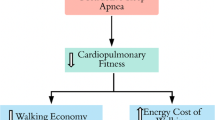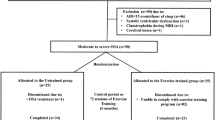Abstract
Obstructive sleep apnea (OSA) is associated with poorer executive function. This study examined the effects of a comprehensive exercise intervention on executive function in overweight adults with mild and moderate-to-severe OSA. Participants aged between 30 and 65 years, with a body mass index (BMI) ranging from 27 to 42 kg/m2, participated in a 6-week exercise program. Standardized polysomnographic recording methods provided total Apnea–Hypopnea Index (AHI) and level of hypoxemia. Executive function was assessed using the NIH Toolbox Flanker Inhibitory Control Test. A submaximal treadmill exercise test evaluated cardiorespiratory fitness. Participants with baseline total AHI between 5 and 14.9 events/h were classified as mild OSA and participants with baseline total AHI 15 ≥ events/h were classified as moderate-to-severe OSA. Fifteen participants completed 18 exercise sessions. Significant differences between OSA categories at baseline were observed for sleep characteristics, but not for fitness or executive function. Wilcoxon signed rank tests showed significant increases in median values for the Flanker Test in the moderate-to-severe category only, z = 2.429, p < 0.015, η2 = 0.737. Six weeks of exercise improved executive function in overweight individuals with moderate-to-severe OSA, but not in those with mild OSA.
Similar content being viewed by others
Data availability
The dataset generated during and/or analysed during the current study is available from the corresponding author on reasonable request.
References
Franklin KA, Lindberg E. Obstructive sleep apnea is a common disorder in the population—a review on the epidemiology of sleep apnea. J Thorac Dis. 2015;7:1311–22.
Bubu OM, Andrade AG, Umasabor-Bubu OQ, Hogan MM, Turner AD, de Leon MJ, et al. Obstructive sleep apnea, cognition and Alzheimer’s disease: a systematic review integrating three decades of multidisciplinary research. Sleep Med Rev. 2020;50:1–24.
Caporale M, Palmeri R, Corallo F, Muscarà N, Romeo L, Bramanti A, et al. Cognitive impairment in obstructive sleep apnea syndrome: a descriptive review. Sleep Breath. 2021;25:29–40.
Seda G, Han TS. Effect of obstructive sleep apnea on neurocognitive performance. Sleep Med Clin. 2020;15:77–85.
Zelazo PD, Anderson JE, Richler J, Wallner-Allen K, Beaumont JL, Weintraub S II. NIH Toolbox cognition battery (CB): measuring executive function and attention. Monogr Soc Res Child Dev. 2013;78:16–33.
Ueno-Pardi LM, Souza-Duran FL, Matheus L, Rodrigues AG, Barbosa ERF, Cunha PJ, et al. Effects of exercise training on brain metabolism and cognitive functioning in sleep apnea. Sci Rep. 2022;12:9453–63.
Berger M, Barthélémy J, Garet M, Raffin J, Labeix P, Roche F, et al. Longer-term effects of supervised physical activity on obstructive sleep apnea and subsequent health consequences. Scand J Med Sci Sports. 2021;31:1534–44.
de Andrade FMD, Pedrosa RP. The role of physical exercise in obstructive sleep apnea. J Bras Pneumol. 2016;42:457–64.
Epstein LJ, Kristo D, Strollo PJJR, Friedman N, Malhotra A, Patil SP, et al. Clinical guideline for the evaluation, management and long-term care of obstructive sleep apnea in adults. J Clin Sleep Med. 2009;5:263–76.
Middleton LE, Ventura MI, Santos-Modesitt W, Poelke G, Yaffe K, Barnes DE. The Mental Activity and eXercise (MAX) trial: effects on physical function and quality of life among older adults with cognitive complaints. Contemp Clin Trials. 2018;64:161–6.
Ludyga S, Held S, Rappelt L, Donath L, Klatt S. A network meta-analysis comparing the effects of exercise and cognitive training on executive function in young and middle-aged adults. Eur J Sport Sci. 2022;1–11.
Ludyga S, Gerber M, Brand S, Holsboer-Trachsler E, Pühse U. Acute effects of moderate aerobic exercise on specific aspects of executive function in different age and fitness groups: a meta-analysis. Psychophysiology. 2016;53:1611–26.
Colcombe S, Kramer AF. Fitness effects on the cognitive function of older adults: a meta-analytic study. Perspect Psychol Sci. 2003;14:125–30.
Mendelson M, Bailly S, Marillier M, Flore P, Borel JC, Vivodtzev I, et al. Obstructive sleep apnea syndrome, objectively measured physical activity and exercise training interventions: a systematic review and meta-analysis. Front Neurol. 2018;9:73–86.
Kline CE, Ewing GB, Burch JB, Blair SN, Durstine JL, Davis JM, et al. Exercise training improves selected aspects of daytime functioning in adults with obstructive sleep apnea. J Clin Sleep Med. 2012;8:357–65.
Chappel-Farley MG, Mander BA, Neikrug AB, Stehli A, Nan B, Grill JD, et al. Symptoms of obstructive sleep apnea are associated with less frequent exercise and worse subjective cognitive function across adulthood. Sleep. 2022;45:1–10.
Stojek MMK, Montoya AK, Drescher CF, Newberry A, Sultan Z, Williams CF, et al. Fitness, sleep-disordered breathing, symptoms of depression, and cognition in inactive overweight children: mediation models. Public Health Rep. 2017;132:65S-73S.
Ott LR, Schantell M, Willett MP, Johnson HJ, Eastman JA, Okelberry HJ, et al. Construct validity of the NIH toolbox cognitive domains: a comparison with conventional neuropsychological assessments. Neuropsychology. 2022;36:468–81.
Weintraub S, Dikmen SS, Heaton RK, Tulsky DS, Zelazo PD, Slotkin J, et al. The cognition battery of the NIH toolbox for assessment of neurological and behavioral function: validation in an adult sample. J Int Neuropsychol Soc. 2014;20:567–78.
Dobrosielski D, Kubitz K, Park H, Patil S, Papandreao C. The effects of exercise training on vascular function among overweight adults with obstructive sleep apnea. Transl Sports Med. 2021;4:606–16.
Tulek B, Atalay NB, Kanat F, Suerdem M. Attentional control is partially impaired in obstructive sleep apnea syndrome. J Sleep Res. 2013;22:422–9.
Chou P-S, Hsu C-Y, Wu M-N, Liou L-M, Lu S-R, Liu C-K, et al. Action-monitoring dysfunction in obstructive sleep apnea—a pilot study. Romigi A, editor. PLoS ONE. 2016;11:1–9.
National Institutes of Health. NIH Toolbox ® Scoring and Interpretation Guide [Internet]. 2016. https://nihtoolbox.force.com/s/article/nih-toolbox-scoring-and-interpretation-guide
Jiang X, Wang Z, Hu N, Yang Y, Xiong R, Fu Z. Cognition effectiveness of continuous positive airway pressure treatment in obstructive sleep apnea syndrome patients with cognitive impairment: a meta-analysis. Exp Brain Res. 2021;239:3537–52.
Kleinloog JPD, Mensink RP, Ivanov D, Adam JJ, Uludağ K, Joris PJ. Aerobic exercise training improves cerebral blood flow and executive function: a randomized, controlled cross-over trial in sedentary older men. Front Aging Neurosci. 2019;11:333–43.
Smiley-Oyen AL, Lowry KA, Francois SJ, Kohut ML, Ekkekakis P. Exercise, fitness, and neurocognitive function in older adults. Ann Behav Med. 2008;36:280–91.
Kleinloog JPD, Mensink RP, Ivanov D, Adam JJ, Uludağ K, Joris PJ. Aerobic exercise training improves cerebral blood flow and executive function: a randomized, controlled cross-over trial in sedentary older men. Front Aging Neurosci. 2019;11:1–11.
Baker LD, Frank LL, Foster-Schubert K, Green PS, Wilkinson CW, McTiernan A, et al. Effects of aerobic exercise on mild cognitive impairment: a controlled trial. Arch Neurol. 2010;67:71–9.
Kemoun G, Thibaud M, Roumagne N, Carette P, Albinet C, Toussaint L, et al. Effects of a physical training programme on cognitive function and walking efficiency in elderly persons with dementia. Dement Geriatr Cogn Disord. 2010;29:109–14.
Lautenschlager NT, Cox KL, Flicker L, Foster JK, Van Bockxmeer FM, Xiao J, et al. Effect of physical activity on cognitive function in older adults at risk for Alzheimer disease: a randomized trial. JAMA J Am Med Assoc. 2008;300:1027–37.
Eggermont LHP, Swaab DF, Hol EM, Scherder EJA. Walking the line: a randomised trial on the effects of a short term walking programme on cognition in dementia. J Neurol Neurosurg Psychiatry. 2009;80:802–4.
O’Brien MW, Kimmerly DS, Mekari S. Greater habitual moderate-to-vigorous physical activity is associated with better executive function and higher prefrontal oxygenation in older adults. GeroScience. 2021;43:2707–18.
Barnes DE, Yaffe K, Satariano WA, Tager IB. A longitudinal study of cardiorespiratory fitness and cognitive function in healthy older adults. J Am Geriatr Soc. 2003;51:459–65.
Etnier JL, Nowell PM, Landers DM, Sibley BA. A meta-regression to examine the relationship between aerobic fitness and cognitive performance. Brain Res Rev. 2006;52:119–30.
Pollicina I, Maniaci A, Lechien JR, Iannella G, Vicini C, Cammaroto G, et al. Neurocognitive performance improvement after obstructive sleep apnea treatment: state of the art. Behav Sci. 2021;11:180–94.
Acknowledgements
The authors would like to acknowledge all our student research assistants for the tireless dedication and support.
Funding
The study was sponsored by the National Heart, Lung, and Blood Institute under grant number 1R15HL133884-01 (Dobrosielski: PI). Support for the study was also provided by the College of Health Professions, Towson University. In addition, Author CP is a recipient of the Instituto de Salud Carlos III Miguel Servet fellowship (grant CP 19/00189).
Author information
Authors and Affiliations
Corresponding author
Ethics declarations
Conflict of interest
KK declares that she has no conflict of interest. HP declares that she has no conflict of interest. SP declares that he has no conflict of interest. CP declares that he has no conflict of interest. DD declares that he has no conflict of interest.
Ethical approval
All procedures performed were in accordance with the ethical standards of the institutional research committee and with the 1964 Helsinki declaration and its later amendments or comparable ethical standards. The study was approved by the Institutional Review Board at Towson University (Approval number: 16-A095).
Informed consent
Written informed consent was obtained from all participants included in the study.
Additional information
Publisher's Note
Springer Nature remains neutral with regard to jurisdictional claims in published maps and institutional affiliations.
Rights and permissions
Springer Nature or its licensor (e.g. a society or other partner) holds exclusive rights to this article under a publishing agreement with the author(s) or other rightsholder(s); author self-archiving of the accepted manuscript version of this article is solely governed by the terms of such publishing agreement and applicable law.
About this article
Cite this article
Kubitz, K.A., Park, H., Patil, S.P. et al. The effects of an exercise intervention on executive function among overweight adults with obstructive sleep apnea. Sleep Biol. Rhythms 21, 185–191 (2023). https://doi.org/10.1007/s41105-022-00433-1
Received:
Accepted:
Published:
Issue Date:
DOI: https://doi.org/10.1007/s41105-022-00433-1




